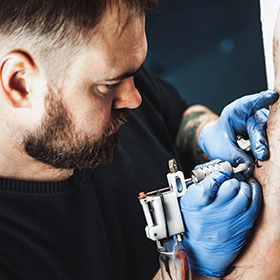Yes, A&D ointment is often used for tattoos. It helps with healing and moisturizing.
Tattoos need proper care to heal well and look good. Many people use A&D ointment on new tattoos. This ointment contains vitamins A and D, which are good for skin healing. It also keeps the tattoo moisturized and prevents it from drying out.
However, is it the best choice for your tattoo? This blog will explore the benefits and drawbacks of using A&D ointment for tattoos. By the end, you’ll know if it’s the right option for you. Keep reading to learn more about tattoo aftercare and how A&D ointment fits in.
Tattoo Aftercare Essentials
Proper aftercare is vital for a new tattoo. It helps in healing and prevents infection. Clean the tattoo gently with mild soap and water. Then, pat dry with a clean towel. Avoid soaking the tattoo in water. Keep it out of the sun.
Using a good ointment can keep the skin moist. This can reduce itching and scabbing. Always follow the artist’s advice on aftercare. Your tattoo will look better and last longer.
Several products can help with tattoo care. Here is a list of some common ones:
- A&D Ointment: Helps keep the tattoo moisturized.
- Unscented Lotion: Keeps skin hydrated without irritation.
- Antibacterial Soap: Cleans the tattoo gently.
- Petroleum Jelly: Provides a barrier to protect the tattoo.
What Is A&d Ointment?
A&D ointment contains vitamin A, vitamin D, and petrolatum. These help skin heal and stay soft. The vitamins aid in skin repair. Petrolatum keeps moisture in the skin. This helps prevent dryness and cracking. A&D ointment is smooth and easy to apply.
A&D ointment has been used for many years. It was first used for diaper rash. It helps protect babies’ skin. Later, people found it helps with minor cuts and burns. Many tattoo artists now recommend it. They believe it helps with healing tattoos. It keeps the skin moist and protected. This can lead to better tattoo results.
Benefits Of A&d For Tattoos
A&D ointment helps speed up the healing process of tattoos. The vitamins in A&D protect the skin. They help repair damaged skin quickly. The ointment reduces itching and redness, making the tattoo more comfortable.
A&D provides excellent moisture to the skin. It keeps the tattooed area hydrated and prevents it from drying out. Well-moisturized skin heals faster and looks better. The ointment forms a protective layer. This locks in moisture and keeps the tattoo from cracking.
Expert Opinions On A&d
Dermatologists often recommend A&D ointment for tattoos. It helps keep the skin moist and protected. This is important for healing. A&D also has vitamins that aid in skin repair. But, some dermatologists warn it can cause allergies. Always test a small area first. If there is redness, stop using it.
Many tattoo artists suggest using A&D ointment. It helps keep tattoos hydrated and soft. This prevents scabbing. Scabbing can damage the tattoo. But, not all artists agree. Some prefer specialized tattoo creams. These are made just for tattoo aftercare. Ask your artist for their best advice.
How To Apply A&d On Tattoos
Applying A&D ointment on tattoos helps keep the skin moisturized. It prevents dryness and promotes healing. Use a thin layer on clean skin for best results.
Step-by-step Guide
First, wash your hands. Clean the tattoo with mild soap and water. Pat it dry with a soft towel. Do not rub. Your skin is sensitive. After drying, take a small amount of A&D ointment. Apply a thin layer over the tattoo. Gently spread it with clean fingers. Avoid using too much. Too much ointment can block air. Your tattoo needs to breathe. Repeat this process as needed. Usually, it is good to apply it 2-3 times a day.
Dos And Don’ts
| Dos | Don’ts |
|---|---|
| Wash hands before applying | Do not rub the tattoo |
| Use mild soap and water | Avoid too much ointment |
| Apply a thin layer | Do not scratch the tattoo |
| Keep the tattoo clean | Avoid exposing it to the sun |
Potential Side Effects
Some people may get an allergy from using A and D ointment. This can cause red skin or a rash. It may become itchy or swollen. If this happens, stop using it and see a doctor. Allergic reactions can be serious. Always test on a small skin area first.
Using too much A and D ointment can clog skin pores. This might lead to pimples or other skin issues. It can also stop the tattoo from healing well. Use a thin layer only. Too much can cause more harm than good. Always follow the artist’s advice.
Alternatives To A&d
There are many ointments you can use for tattoos. Aquaphor is a popular choice. It keeps the skin moist. Hustle Butter is another option. It is all-natural and vegan. Tattoo Goo is made for tattoos. It helps with healing and color retention. Bepanthen is often recommended by tattoo artists. It soothes the skin and reduces itching.
Coconut oil is a great natural remedy. It fights bacteria and keeps the skin hydrated. Shea butter is also good. It has vitamins and helps the skin heal. Aloe vera can soothe and cool the skin. It reduces redness and swelling. Tea tree oil is another option. It has antiseptic properties and fights infection.
Long-term Tattoo Care
Keeping your tattoo bright is key. Use a moisturizer daily. Choose one with no scent. This helps in keeping the colors sharp. Sun can fade your tattoo. Always use sunscreen. SPF 30 or higher is best. Avoid soaking your tattoo in water. This can make the colors dull. Pat your tattoo dry after washing. Never rub it.
Clean your tattoo gently. Use mild soap and warm water. Pat it dry with a clean towel. Do not scratch or pick at it. This can cause infection. Wear loose clothing. Tight clothes can irritate your tattoo. Avoid touching your tattoo with dirty hands. Always keep it clean and dry. Use antibiotic ointment if your artist recommends it. This helps in keeping infections at bay.
Conclusion
A and D ointment can help heal tattoos. It keeps the skin moist. This aids in faster healing. Many tattoo artists recommend it. Always follow your artist’s advice. Everyone’s skin is different. Test a small area first. Ensure no allergies occur.
Proper aftercare is essential. Your tattoo will look great longer. So, make sure to care for it well.

